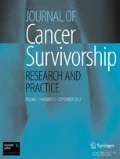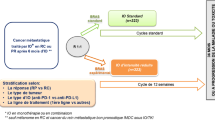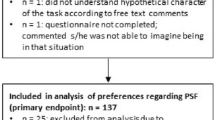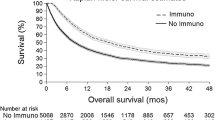Abstract
Purpose
Immune checkpoint inhibitors (ICI) and BRAF and MEK inhibitors (BMi) have improved survival in metastatic melanoma (MM). However, the experience of long-term responders remains undescribed. This study characterised survivorship issues faced by long-term responders to ICI or BMi.
Methods
Patients with MM, aged ≥ 18 years old, ≥ 6 months post-ICI or BMi initiation with an objective response or stable disease. A 72-question survey assessed physical and psychological effects, impact on lifestyle, access to information, satisfaction with care, and availability of supports.
Results
One hundred and five of 120 (88%) patients completed the survey (ICI 69/BMI 36). For the ICI cohort, 39 (57%) were receiving ongoing treatment, 17 ceased due to toxicity and 13 due to a sustained response. For the BMi cohort, 31 (85%) were receiving ongoing treatment, 4 ceased due to toxicity and 1 due to a sustained complete response. At data cut-off on 18 December 2018, median PFS (range) was 2.5 years (1.3–8.5) for ICI and 3.1 years (0.6–7.3) for BMi. Long-term toxicities included dry/itchy skin (ICI 51, 74%/ BMi 25, 69%), arthralgias (ICI 30, 58%/ BMi 23, 64%) and fatigue (ICI 62, 90%/ BMi 33, 92%). Psychological morbidity was common, including anxiety awaiting results (ICI 50, 72%/ BMi 29, 81%), fear of melanoma recurring or progressing (ICI 56, 81%/ BMi 31, 86%) or death (ICI 44, 64%/ BMi 26, 72%).
Conclusion
MM survivors experience chronic treatment toxicities and frequently report psychological concerns.
Implications for Cancer Survivors
Survivors may benefit from discussions regarding long-term toxicities and tailored psychological supports.




Similar content being viewed by others
References
Balch CM, Gershenwald JE, Soong SJ, Thompson JF, Atkins MB, Byrd DR, et al. Final version of 2009 AJCC melanoma staging and classification. J Clin Oncol. 2009;27(36):6199–206.
Long GV, et al. Long-term outcomes in patients with BRAF V600-mutant metastatic melanoma who received dabrafenib combined with trametinib. J Clin Oncol. 2017:Jco2017741025.
Schadendorf D, Long GV, Stroiakovski D, Karaszewska B, Hauschild A, Levchenko E, et al. Three-year pooled analysis of factors associated with clinical outcomes across dabrafenib and trametinib combination therapy phase 3 randomised trials. Eur J Cancer. 2017;82:45–55.
Ascierto PA, et al. Cobimetinib combined with vemurafenib in advanced BRAF V600-mutant melanoma (coBRIM): updated efficacy results from a randomised, double-blind, phase 3 trial. Lancet Oncol. 2016;17(9):1248–60.
Hodi, S.F., et al., Durable, long-term survival in previously treated patients with advanced melanoma who received nivolumab monotherapy in a phase I trial. Presented at the 2016 AACR Annual Meeting; April 16-20, New Orleans Louisiana. Abstract CT001, 2016.
Robert, C., et al., Long-term outcomes in patients (Pts) with advanced melanoma treated with pembrolizumab (Pembro): 4-year overall survival (OS) results from KEYNOTE-001, in 7th European Post-Chicago Melanoma/Skin Cancer Meeting. 2017: Munich.
Callahan MK, Kluger H, Postow MA, Segal NH, Lesokhin A, Atkins MB, et al. Nivolumab plus ipilimumab in patients with advanced melanoma: updated survival, response, and safety data in a phase I dose-escalation study. J Clin Oncol. 2018;36(4):391–8.
Schadendorf D, Dummer R, Hauschild A, Robert C, Hamid O, Daud A, et al. Health-related quality of life in the randomised KEYNOTE-002 study of pembrolizumab versus chemotherapy in patients with ipilimumab-refractory melanoma. Eur J Cancer. 2016;67:46–54.
Revicki DA, van den Eertwegh AJM, Lorigan P, Lebbe C, Linette G, Ottensmeier CH, et al. Health related quality of life outcomes for unresectable stage III or IV melanoma patients receiving ipilimumab treatment. Health Qual Life Outcomes. 2012;10(1):66–6.
Long GV, Atkinson V, Ascierto PA, Robert C, Hassel JC, Rutkowski P, et al. Effect of nivolumab on health-related quality of life in patients with treatment-naïve advanced melanoma: results from the phase III CheckMate 066 study. Ann Oncol. 2016;27(10):1940–6.
Schadendorf D, Larkin J, Wolchok J, Hodi FS, Chiarion-Sileni V, Gonzalez R, et al. Health-related quality of life results from the phase III CheckMate 067 study. Eur J Cancer. 2017;82:80–91.
Grob JJ, et al. Comparison of dabrafenib and trametinib combination therapy with vemurafenib monotherapy on health-related quality of life in patients with unresectable or metastatic cutaneous BRAF Val600-mutation-positive melanoma (COMBI-v): results of a phase 3, open-label, randomised trial. Lancet Oncol. 2015;16(13):1389–98.
Schadendorf D, Amonkar MM, Stroyakovskiy D, Levchenko E, Gogas H, de Braud F, et al. Health-related quality of life impact in a randomised phase III study of the combination of dabrafenib and trametinib versus dabrafenib monotherapy in patients with BRAF V600 metastatic melanoma. Eur J Cancer (Oxford, England : 1990). 2015;51(7):833–40.
Winstanley JB, White EG, Boyle FM, Thompson JF. What are the pertinent quality-of-life issues for melanoma cancer patients? Aiming for the development of a new module to accompany the EORTC core questionnaire. Melanoma Res. 2013;23(2):167–74.
Rogiers, A., et al., Psychosocial outcome and health related quality of life (HRQoL) in advanced melanoma survivors, in 2018 ASCO Cancer Survivorship Symposium. 2018: Orlando, Florida, USA.
Temel JS, Gainor JF, Sullivan RJ, Greer JA. Keeping expectations in check with immune checkpoint inhibitors. J Clin Oncol. 2018;36(17):1654–7.
Hodi FS, O’Day SJ, McDermott D, Weber RW, Sosman JA, Haanen JB, et al. Improved survival with ipilimumab in patients with metastatic melanoma. N Engl J Med. 2010;363(8):711–23.
Wolchok JD, et al. Nivolumab plus ipilimumab in advanced melanoma. N Engl J Med. 2013;369(2):122–33.
Robert, C., Ribas A., Hamid O., Daud A., Wolchok J.D., Joshua A.M., Hwu W.J., Weber J.S., Gangadhar T.C., Joseph R.W., Dronca R.S., Patnaik A., Zarour H.M., Kefford R., Hersey P., Li X., Diede S.J., Ebbinghaus S., Hodi F.S., Three year overall survival for patients with advanced melanoma treated with pembrolizumab in KEYNOTE-001. J Clin Oncol, 2016. 34(suppl: abstr 9503), 9503.
Hauschild A, Grob JJ, Demidov LV, Jouary T, Gutzmer R, Millward M, et al. Dabrafenib in BRAF-mutated metastatic melanoma: a multicentre, open-label, phase 3 randomised controlled trial. Lancet. 2012;380(9839):358–65.
Schachter J, et al. Pembrolizumab versus ipilimumab for advanced melanoma: final overall survival results of a multicentre, randomised, open-label phase 3 study (KEYNOTE-006). Lancet. 10105;390:1853–62.
Aaronson NK, Ahmedzai S, Bergman B, Bullinger M, Cull A, Duez NJ, et al. The European Organization for Research and Treatment of Cancer QLQ-C30: a quality-of-life instrument for use in international clinical trials in oncology. J Natl Cancer Inst. 1993;85(5):365–76.
Cormier JN, Ross MI, Gershenwald JE, Lee JE, Mansfield PF, Camacho LH, et al. Prospective assessment of the reliability, validity, and sensitivity to change of the Functional Assessment of Cancer Therapy-Melanoma questionnaire. Cancer. 2008;112(10):2249–57.
Winstanley JB, Young TE, Boyle FM, Bergenmar M, Bottomley A, Burmeister B, et al. Cross-cultural development of a quality-of-life measure for patients with melanoma: phase 3 testing of an EORTC Melanoma Module. Melanoma Res. 2015;25(1):47–58.
Wright P, Smith AB, Keding A, Velikova G. The Social Difficulties Inventory (SDI): development of subscales and scoring guidance for staff. Psychooncology. 2011;20(1):36–43.
Schofield P, Gough K, Lotfi-Jam K, Aranda S. Validation of the Supportive Care Needs Survey-short form 34 with a simplified response format in men with prostate cancer. Psychooncology. 2012;21(10):1107–12.
Levy D, et al. Certainty within uncertainty: a qualitative study of the experience of metastatic melanoma patients undergoing pembrolizumab immunotherapy. Support Care Cancer. 2018.
Dunn, J., et al., Systematic review of psychosocial outcomes for patients with advanced melanoma. Psycho-Oncology, 2016: p. n/a-n/a.
Wolchok JD, et al. Overall survival with combined nivolumab and ipilimumab in advanced melanoma. N Engl J Med. 2017;377(14):1345–56.
Koch L, Jansen L, Brenner H, Arndt V. Fear of recurrence and disease progression in long-term (>/= 5 years) cancer survivors--a systematic review of quantitative studies. Psychooncology. 2013;22(1):1–11.
Dieng M, Butow PN, Costa DSJ, Morton RL, Menzies SW, Mireskandari S, et al. Psychoeducational intervention to reduce fear of cancer recurrence in people at high risk of developing another primary melanoma: results of a randomized controlled trial. J Clin Oncol. 2016;34(36):4405–14.
Deimling GT, Bowman KF, Sterns S, Wagner LJ, Kahana B. Cancer-related health worries and psychological distress among older adult, long-term cancer survivors. Psychooncology. 2006;15(4):306–20.
Bauml JMMD, et al. Scan-associated distress in lung cancer: quantifying the impact of “scanxiety”. Lung Cancer. 2016;100:110–3.
Carrera PM, Kantarjian HM, Blinder VS. The financial burden and distress of patients with cancer: understanding and stepping-up action on the financial toxicity of cancer treatment. CA Cancer J Clin. 2018;68(2):153–65.
Yabroff KR, Dowling EC, Guy GP Jr, Banegas MP, Davidoff A, Han X, et al. Financial hardship associated with cancer in the United States: findings from a population-based sample of adult cancer survivors. J Clin Oncol. 2016;34(3):259–67.
Paul CL, et al. Impact of financial costs of cancer on patients – the Australian experience. Cancer Forum. 2017;41:2.
Brennan ME, Gormally JF, Butow P, Boyle FM, Spillane AJ. Survivorship care plans in cancer: a systematic review of care plan outcomes. Br J Cancer. 2014;111(10):1899–908.
Mayer, D.K., et al., Summing it up: an integrative review of studies of cancer survivorship care plans (2006-2013). Cancer, 2015. 121(7): 978–996.
Institute of Medicine and the National Research Council. In: Hewitt M, Greenfield S, Stovall E, editors. From cancer patient to cancer survivor: lost in transition. Washington, DC: The National Academies Press; 2006. p. 534.
American Society of Clinical Oncology, American Society of Clinical Oncology Clinical Practice Survivorship Guidelines and Adaptations. 2014 [cited 2018 7 July]; Available from: www.asco.org/guidelines/survivorship.
Mayer M, et al. Symptom burden and quality of life among women with HER2(+) metastatic breast cancer. Breast J. 2015;21(2):208–10.
Acknowledgements
We would like to thank the Skin and Melanoma Service at Peter MacCallum Cancer Centre for their support with patient enrolment and data collection, and the Melanoma Research Victoria Consumer Group for reviewing the questionnaire.
Funding
This work was financially supported by a Research Grant from the Skin and Melanoma Service, Peter MacCallum Cancer Centre.
Author information
Authors and Affiliations
Corresponding author
Ethics declarations
Conflict of interest
CK has received travel assistance from Roche. DM has received honoraria and consultancy fees from Bristol-Myers Squibb, MSD and Novartis, and institutional research funding from Merck. SS has received honoraria and consultancy fees from Bristol-Myers Squibb and Merck. MJ has received travel assistance from Roche. All remaining authors have declared no conflicts of interest.
Ethical approval
All procedures were in accordance with the ethical standards of the institutional and/or national research committee and with the 1964 Declaration of Helsinki and its later amendments or comparable ethical standards.
Additional information
Publisher’s note
Springer Nature remains neutral with regard to jurisdictional claims in published maps and institutional affiliations.
Rights and permissions
About this article
Cite this article
Lai-Kwon, J., Khoo, C., Lo, S. et al. The survivorship experience for patients with metastatic melanoma on immune checkpoint and BRAF-MEK inhibitors. J Cancer Surviv 13, 503–511 (2019). https://doi.org/10.1007/s11764-019-00770-0
Received:
Accepted:
Published:
Issue Date:
DOI: https://doi.org/10.1007/s11764-019-00770-0




